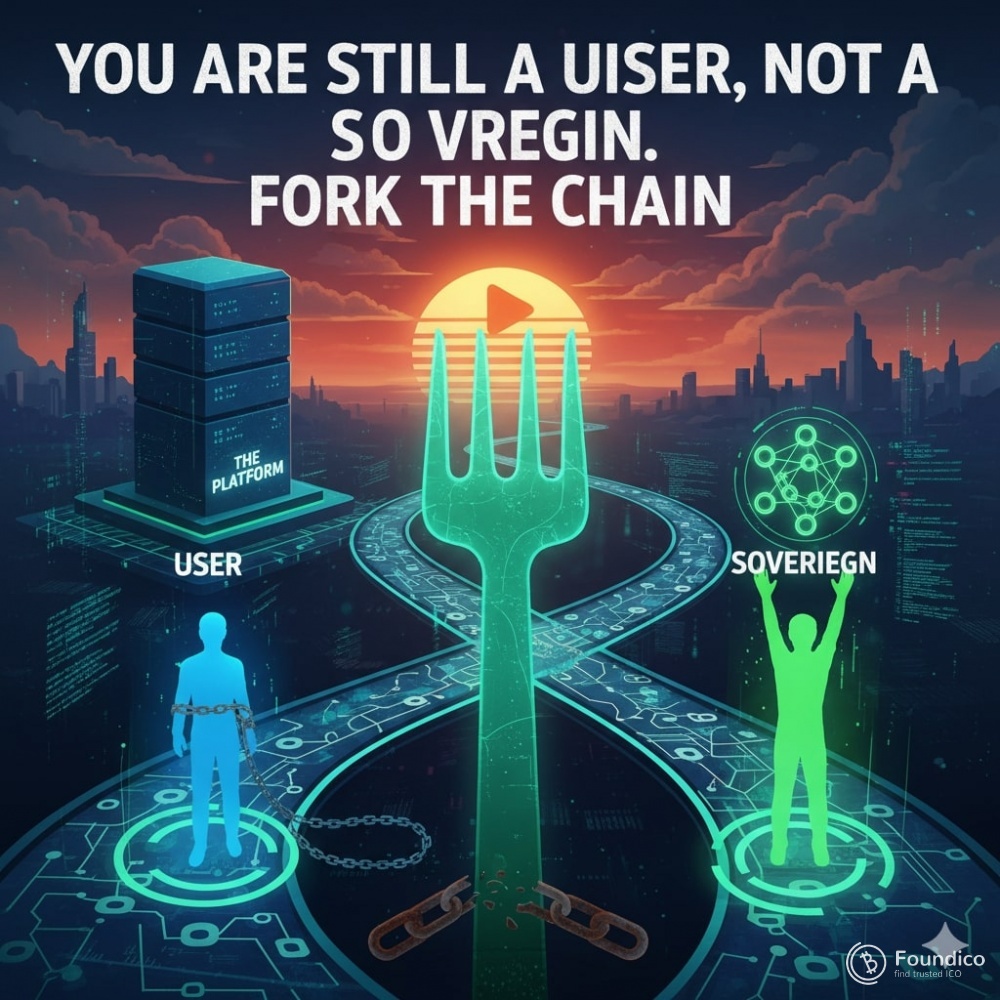You Are Still a User, Not a Sovereign. Fork the Chain

By Dr. Pooyan Ghamari, Swiss Economist and Visionary
The promise of cryptocurrency was intoxicating: a world where you could be your own bank, free from the grip of centralized institutions. No kings, no masters—just code, consensus, and individual sovereignty. Yet, as the crypto ecosystem has grown, a stark reality has emerged. You, the individual, are not a sovereign. You are still a user, tethered to the whims of developers, whales, and protocols. The path to true sovereignty lies in one radical act: forking the chain.
The Illusion of Sovereignty
When you hold a private key, you control your assets. This is the gospel of crypto—a mantra that feels like liberation. But zoom out, and the picture changes. The blockchain you rely on is shaped by others: developers who write the code, miners or validators who secure the network, and whales whose trades sway markets. Your private key gives you a sliver of control, but the rules of the game are set by those with deeper influence.
Consider the Ethereum Merge or Bitcoin’s Taproot upgrade. These weren’t your decisions—they were debated and decided by a small cadre of insiders. If you disagreed, your options were limited: comply or leave. Even DeFi protocols, heralded as bastions of decentralization, often hinge on governance tokens concentrated in the hands of a few. You can stake, trade, or hodl, but you’re still playing in someone else’s sandbox. You’re a user, not a sovereign.
The Chains That Bind
This isn’t the fault of bad actors; it’s the nature of systems. Blockchains are not self-governing utopias—they’re human creations, prone to power imbalances. Developers hold the keys to protocol upgrades. Miners or validators can collude to censor transactions. Exchanges, often the gateways to crypto, can freeze your funds or delist your favorite token. Even the community’s voice, amplified through platforms like X, is swayed by influencers who command attention.
The result? You’re free to use the system, but you don’t control it. Your private key is a lease, not a deed. The blockchain’s rules, its upgrades, its very existence depend on others. Sovereignty implies self-rule, but in crypto, you’re still subject to the decisions of a networked elite.
The Fork: Your Path to Sovereignty
There is a way to reclaim agency: fork the chain. A fork—especially a hard fork—is the ultimate act of rebellion. It lets you reject the status quo and build a new reality. When the rules don’t suit you, when the kings of crypto—developers, whales, or validators—steer the network against your interests, a fork is your guillotine. It’s the tool to cut free and redefine the system.
Forks have history. Bitcoin Cash split from Bitcoin to prioritize larger blocks and lower fees. Ethereum Classic emerged when a faction rejected Ethereum’s rollback of the DAO hack. These weren’t just technical splits; they were declarations of independence. They proved that no blockchain is immutable when the community demands change.
Forking as Empowerment
Forking isn’t easy—it’s a revolution, not a tantrum. It requires coordination, technical skill, and enough support to sustain a new chain. You need developers to maintain the code, miners or validators to secure the network, and a community to give the fork legitimacy. But this is precisely why forking is powerful. It forces you to move beyond being a passive user and become an active creator.
You don’t need to fork alone. Communities on platforms like X can rally around a shared vision. Open-source code means anyone can clone a repository and start building. A fork doesn’t even need to overthrow the original chain—it can coexist, offering an alternative for those who share your values. Every successful fork chips away at the myth of centralized control, proving that sovereignty is possible.
The Cost of Staying a User
Remaining a user is comfortable but costly. You’re at the mercy of upgrades you didn’t choose, fees you can’t control, and market swings driven by others. The longer you accept this, the more entrenched the power of crypto’s elite becomes. Sovereignty isn’t handed to you—it’s claimed. A fork is your chance to rewrite the rules, to build a chain that reflects your vision, whether it’s lower fees, better privacy, or fairer governance.
A Call to Action
Crypto was born from rebellion, but it’s at risk of becoming another system of gatekeepers. You are not a sovereign yet—you’re a user, bound by chains you didn’t forge. But you have the power to change that. Fork the chain. Rally a community, redefine the rules, and build something new. The tools are in your hands: open-source code, decentralized networks, and platforms to organize. Stop accepting the default. Stop being a user. Fork the chain, and claim your sovereignty.
Dr. Pooyan Ghamari is a Swiss economist and visionary, exploring the intersections of technology, finance, and human freedom.
